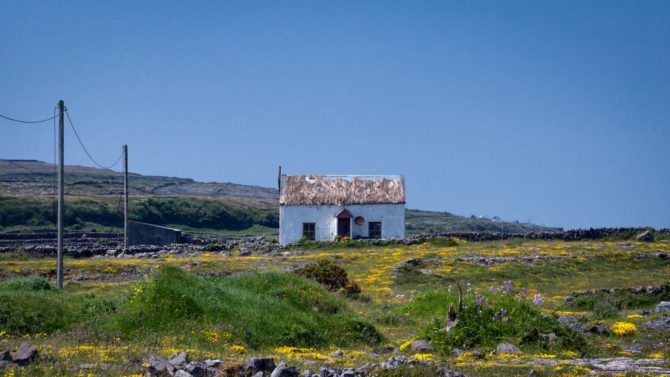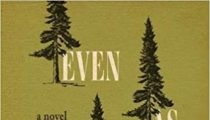Knox Thompson first crossed paths with the man who would…

Scalpeen
1
There is a racial memory by which the past is continually accumulated and preserved.
—Henri Bergson, A New Philosophy
Even before my father bought a remote parcel of brushy-up land in Appalachian Ohio’s Monroe County (which land and the people living around it has become a major source of writing for me over a half-century) there was one place among many that particularly ignited my vivid youngster’s imagination. Think of the enthusiasm of the boyish Mark Twain for a life on the Mississippi; I had something of the same enthusiasm, though more precisely a strange, sometimes overwhelming nostalgia, for some dimly-remembered but nevertheless emotionally powerful place and its concurrent life that, as a boy, I thought I could glimpse from my grandparents’ front porch in Steubenville.
118 Logan Street stands three houses up from the river; about thirty giant steps could get me from the sidewalk there to the riverbank, and it was a journey I took often in my youth. But I remember equally as vividly sitting rapt in one of the metal lawn chairs on the gritty wooden porch my grandmother scrubbed almost every day, seeing maybe a half-mile away, as the crow flies, and three hundred feet atop the cliffs of West Virginia across from the paper mill, a lush green field sloping steeply downward, and from which I could not look away. In my imagination, I could feel the pitch of that far piece of land beneath me, feel the breezes that must have blown at that height. Oddly enough, I do not remember seeing Steubenville from that visionary point; and it is this detail which hints at the deeper remembering I suspect was going on during those long reveries.
James Cavanaugh Hague, my grandfather, and Helen Madigan, my grandmother, were descendants of Irish immigrants to Steubenville, their ancestors’ earliest arrivals, as far as we can tell, slightly predating the mass exodus during the Great Hunger of the late 1840s. Despite there being only the thinnest shreds of information regarding our families in Ireland, one story survived. My Uncle Jack showed me a handwritten letter that said his great-grandmother, (this would be my great-great grandmother) Margaret Cavanaugh, sailed over as an infant in the late 1830s. She was fed fresh goat’s milk during the voyage, and the ladle from which it was gathered and served had supposedly remained in the family long enough for him to have seen it as a boy.
I don’t know: I never saw such a thing, nor did any of Jack’s five kids, my Hague cousins, though I do have great-grandfather Richard’s shoe last and cobbler’s hammer. But the point is that the field high atop the West Virginia cliff, unfenced, steepening downward toward the edge, I did see, as if again, fifty years later. In May of 2015, my wife and I stood at the edge of the Cliffs of Moher on Ireland’s southwest coast, dizzied not only with the beauty and height and sheer drop of them, but, for me, by an overwhelming sensation of déjà vu. Surely, somewhere in my DNA, or in the collective unconscious, whatever you want to call it, I was at a familiar place. That high, green West Virginia field of my boyhood was here; the Cliffs of Moher were back there, across the Atlantic Ocean and the Appalachian mountains and the Ohio River a half-century before, in Steubenville.
If this were the only such incident of such strong “racial memory,” as a Jungian term names it, to strike me in my boyhood, I could write it off as just some sort of odd psychological phenomenon, the result of an over-active imagination working on nebulous speculations, perhaps even remnants of the fever-dreams during my boyhood bout with mononucleosis. But it isn’t the only occurrence.
2
Life can only be understood backwards….
—Søren Kierkegaard
When I was about ten, my father built a concrete block shed, very solid, in our tiny backyard. A great pile of excavated soil lay next to where he’d dug the footers for the foundation. After the concrete was poured and the trenches for the footers back-filled, the level grassless spot where the pile had been drew me to develop a project that lasted the rest of the season.
At first, I conceived of the excavation I began as a foxhole. However inaccurately or helter-skelterly, boys my age knew that our fathers had been at war not long ago, and the notion of foxhole, I suppose, enabled us to imagine fairly concretely a part of that experience. I dug with a short-handled shovel, as, I imagined, my father had dug in New Guinea, Okinawa, the Philippines. I piled the soil to one side like a berm. At last a crater-like hole, about a yard wide at its top and just as deep, flooded with sunlight in the sweaty afternoon.
But something was not right: this naked hole seemed unfinished; to slide down into it and just sit there created nothing in the imagination—no real sense of danger, no breathless battle fatigue, no thrill of combat, shells screaming overhead, no crazed enemy shouting banzai and hurtling atop me, his bayonet jabbing at my ribs, blood in his eyes, and haunting my nightmares for decades after, as it had been for my post-traumatic-stress-disordered father.
One day, I raided the pile of weathered boards dad had salvaged from a stricken barn out in the country and with which he planned to roof the shed. I dragged four or five to the hole and lay them over it; shoved tightly together, they looked like a trap door. I pushed a board aside at one end and slid through the gap into the claydamp darkness. Then, crouched inside, I shifted the board from below back into place, extinguishing the light.
This was more like it. I sat there, a tiny boy hidden in a board-covered hole in a backyard not far from an adandoned stripmine, not far from the hissing steel mills just over the hill, not far from the omnivorous river that vomited everything it carried into the sea—trees, broken dolls, wrecked boats— excepting only the swollen remains of the girlfriend I was to lose to it at the end of the next part of my life. In that backyard hole’s dank enveloping, still a boy unacquainted with the darker chapters of life, I felt a strange, earthy safeness.
It was at least two decades later that I first learned about the scalpeen, a desperate temporary shelter built by displaced and starving rural Irish run out of their cottages and off the land by the English. The scalpeen, or scalp, was a shelter often constructed by laying sticks or branches over nothing more than a roadside ditch, some hole along the way. On that last day of the first part of my life I was re-enacting, though in full ignorance of it, the experience of my ancestors. In a kind of combined fore-knowledge and ancestral memory of the meanness, violence, and injustice of the world, I huddled, as perhaps some of my own realtives had, though in a womb-like darkness, calm, unformed and uninformed, not knowing I was soon to be delivered into the brilliant blast of light which is the knowledge of evil.
3
Through the study of history, we make the past usable,
turning handfuls of raw facts into meaningful narratives.
—Laura F. Edwards, Writing Between the Past and the Present
This ending of what I might call the first part of my life had been held, undeveloped, almost entirely unexamined; for all intents and purposes, unlived, if living teaches us anything, for six decades (though I have recalled it now and again during those nearly sixty years). Is it possible that many of our experiences, though vividly remembered, (or inherited from a distant ancestral realm, even from as far away and long ago as that archetypal galactic past of Star Wars)—is it possible that such experiences have yet to be smelted into what we might call self-knowledge, let alone wisdom? Is it necessary to write (or dance, or draw, or sing) about, say, such boyhood memories as I recount here, in order to discover (communicate, construct, compose, complete) their meaning?
Here, near the end of some part of my life, (I have just achieved the Biblical three score and ten), while at the same time headed inevitably— but not too quickly, I hope—toward another significant hole in the ground, I am pretty sure it is so. Art completes us; it is a way we have of recovering and understanding what seemed lost to time.
Our past is not past. In my case, at least, as long as there’s more to be uncovered and gathered up, articulated—to be literally re-membered, from the dismembered bones of my family history scattered across windy fields both far off in Ireland and here in America—my past is clearly not finished.
4
Postscript
And so it is not. A couple of years after writing the above, I stumbled across, online of all places, the front-page obituary of my great-great-grandfather and in it the revelation of the existence of his first wife, my great-great-grandmother, both of whom I had until then known nothing about. I knew about Annie Butler, the somewhat infamous (though probably impatient of his drinking) wife of my great-grandfather and namesake Richard. It turns out the obituary was about his father-in-law, Theodore A. Butler, who died in June of 1907. He had come to Steubenville with his parents (they remain nameless and undiscovered to me still) from Hagerstown, Maryland in 1828. Most remarkable to me is this: “In early life he followed the river and has been over the river from Pittsburgh to New Orleans frequently.” For a person who has all his life been a river rat, this came as a kind of genetic lightning bolt: if there is a rivering gene, I certainly have inherited it. Now I had an entirely new connection to the past, one that might lead to identifying at least one line of original Irish descent. Who were his parents? Who were his first wife Alice Moore’s parents? Where did they come from? When? There is in all of this the same strange nostalgia, the longing for knowing these people and their lives, that I felt as a boy staring out over the river at that high green West Virginia field.
I do not know that other people have such an intense sensation of the past as I seem to do; I do not know what it means, exactly, either. Is it a response to my own life time so rapidly shortening? Or is it an intimation of the long time, the deep time, into which I myself will soon be plunged, to exist only in photos and words and memory, a few generations from now, perhaps, to drop into namelessness until the entire human family comes to an end? There is an exhilaration in considering such depths of time and such incredibly detailed but relentlessly transient remains of our days and lives.
We are involved in something really big here, and most of the time we miss it, either out of haste, or distraction, or denial. Only if we’re lucky, as I have been, do we begin to experience intimations of it, hints that come to us as names, places, lost photographs, the little pieces of the family story, like that of Annie Butler’s anger and of her throwing furniture out of a second-story window and setting it afire. It’s that house, I imagine, that you can see in the upper left of the photograph above Theodore Butler’s great-grandsons. James R. Hague is my father. This is the story as I know it now. How long this will be the “past,” I do not know. Each new finding keeps it alive, growing back like an amputated finger in a magic story of renewal, the tale of a kind of family immortality.
Somewhere back there, an ancestor may have survived by digging a scalpeen. As surely as the river has entered my racial memory, so too has that grubby hole, out of which continues somehow to issue the family called Hague.



